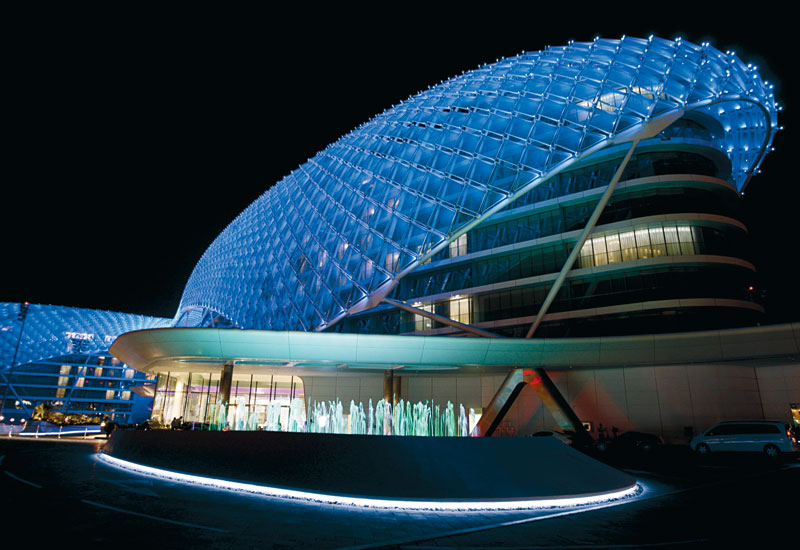Average daily rates (ADR) were around AED 2650 (US $721) at Rotana Yas Island, AED 2500 ($680) at Radisson and around AED 1850 ($503) at Park Inn, for example.
In September, IDeaS Advantage senior consultant Paul Van Meerendonk told Hotelier that during special events like a Grand Prix, it is especially important for hotels to keep a tight control on room inventory. He said appropriate overbooking levels should be set to account for the expected higher rate of cancellations.
In spite of having little experience managing host hotels for an event of that scale, hotel management at all seven properties wisely implemented minimum-stay periods and cancellation clauses, though most did not overbook. “People were paying a lot of money and we could not walk them somewhere else if we were full because every other hotel on the island was full,” explains Batshoun.
However, inexperience was evident in other areas. The “tsunami” of guests Batshoun mentioned certainly took Yas Island Rotana’s F&B outlets by surprise, so much so that Batshoun and the hotels’ department heads found themselves cleaning tables.
“There were scheduled events where up to 50,000 people were leaving at the same time and they all wanted something to eat and drink. The shuttle bus stopped just before the hotel and people could see guests on the restaurant terraces and wanted to come in. It was difficult trying to serve everybody and we tried to limit the number of people coming in, but they were just very upset. It was a huge learning opportunity,” says Batshoun.
On the other hand, Radisson and Park Inn expected the wave of guests. “We had a ‘tsunami’ warning out and we tried to channel as many guests as possible to our buffet restaurant, which is obviously easier for us to cope with”, Bodin says.
On the best race day, Radisson’s food and beverage outlets made 1480 covers, where as Choices buffet restaurant at the Yas Island Rotana had specific meal times that, unfortunately, didn’t synchronise with event timings. So people left an event at 2:30 pm and came to the restaurant at 3:30 pm to find the buffet had closed half an hour ago, for example.
The hotel extended its buffet timings for the remaining race days to open from around midday to the early hours of the morning, and on the up side, it doubled its forecast revenue from F&B over the race period.

Advertisement
Sufficient staffing
Opening to 100% occupancy with an enormous demand for F&B was never going to be easy, but aside from some slight oversights, all seven hotels had prepared well in terms of staff training and product supplies.
Crowne Plaza & Staybridge Suites Abu Dhabi Yas Island prepared for full occupancy with more than 100 staff brought in from other properties that left just after the race, according to complex GM Dieter Franke.
Similarly, the two Rotana properties had around 70 staff assistants from other Rotana hotels.
Radisson and Park Inn, however, only had 25-30 staff brought in and Bodin probably wasn’t exaggerating when he said employees did a “tremendous job” as the hotels only staffed for around 50% occupancy to account for reduced demand after the race.
Bodin accepts that “of course there were some unhappy guests and on some occasions we compensated them for a stay that wasn’t perfect, but the majority was more than satisfied and we received many ‘thank you’ letters”.
The Yas Hotel didn’t have the benefit of having sister properties to pull its 800 plus employee base from, but the hotel put a successful operation down to pre-planning.
“We hired staff earlier and did a huge amount of off-site training that really paid off. You needed experience and flexibility,” says Bell.
In the months leading up to the race, up to 2000 staff members were recruited across the seven hotels; many flocked to Yas Island from Dubai properties that had frozen pay rises and promotions in the midst of the global economic downturn, but the Yas Island hotels weren’t offering anything “extraordinary” in terms of its staff packages, according to Bell.
“The excitement of the product, the location and the relative stability of the Abu Dhabi hotel market was attractive to staff inside and outside the UAE,” he says.
“We were fortunate because we were recruiting when a lot of other hotels were letting people go,” adds Batshoun, who says 40% of employees came from existing Middle East Rotana properties, around a quarter from Dubai and the rest from overseas countries, such as India and a new source market, China.
Luckily, the ‘excitement’ of the Yas Island project made it a priority for most suppliers too, who were very “committed”, say the hotels, but they were understandably “stretched”.
Rotana had some challenges with fresh produce and the Rezidor hotels faced problems with laundry, but considering that seven hotels opened on Yas Island to one deadline, the operation was relatively smooth.









 Search our database of more than 2,700 industry companies
Search our database of more than 2,700 industry companies









